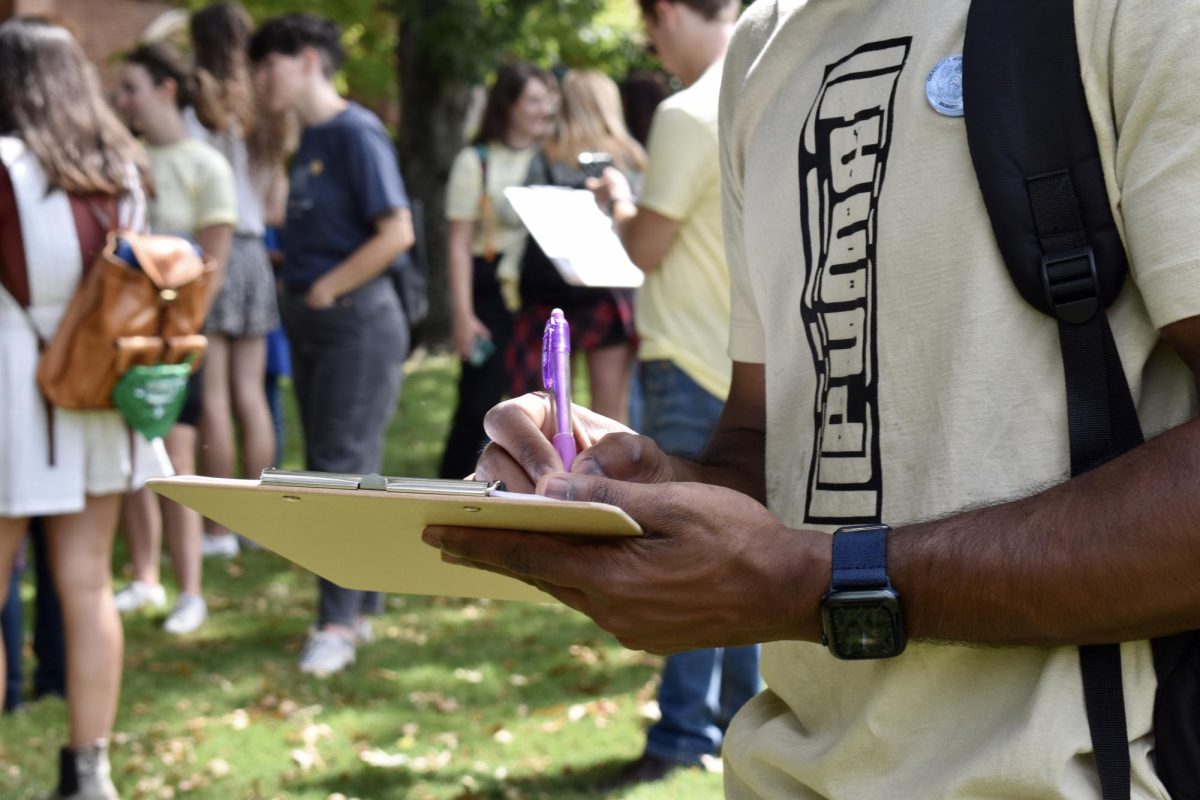A few miles south of Nashville, General Motors’ largest assembly plant joined thousands of fellow automobile manufacturing workers in walking out on their jobs to demand better benefits in a time of rising cost of living and stagnant wages.
The United Auto Workers cited this rise as the reason for the strike. Combined with aggressive negotiation tactics from union leadership, their efforts have paid off in an agreement with the “big three” automakers, including pay raises of 150% for temporary workers, raises of 33% for veteran workers and other provisions. This year has been a remarkable year for union activity across the country, with hundreds of strikes involving over 400,000 workers. Strikingly, this exercise of workers’ power unfolds against the backdrop of historically high union approval and low membership rates.
Before transferring to Vanderbilt, I was involved with supporting and covering union activity on-campus at Loyola University New Orleans and in greater New Orleans. I saw similar issues there as I did back home in Kansas City. I saw myself and my own community in the faces of the workers with whom I spoke.
My low-income and working-class background encourages me to support union movements. As I listened to complaints from friends and family about their workplace, I noticed that many of these issues could be avoided if there was a union. Particularly, there is hardly any protection from the arbitrariness of at-will employment which has affected so many of my loved ones.
Although my interest in the union solidarity movement has largely been influenced by my life experiences, my admiration for the accomplishments of working-class leaders is also rooted in what they do to better society. These union leaders accomplish great feats like taking care of families while working and organizing. They risk their jobs to advocate for themselves and their coworkers. These accomplishments exemplify the resilience and resourcefulness of the working class and the need to support their collective action. Students must support workers’ struggle against the economic and corporate tyranny that will touch all of our lives and recognize the importance of mass movements.
Beyond individual success stories, unions play a vital role in shaping a more democratic and happier society. They build worker power in the workplace, where we spend a third of our lives. Unions make a strong push for economic justice, and having higher wages, better healthcare, less income inequality and safer workplace environments unsurprisingly leads to a longer and better quality of life. A struggle for a better life is in front of us, and we should support it by taking advantage of our unique position as students at an elite university.
There is a noticeable disconnect between working-class people and college students, especially at elite institutions. Oftentimes, you’ll hear that many college campuses like Vanderbilt are bubbles. Isolation from the broader community feels inevitable especially when it’s a private university drawing in thousands of affluent individuals. However, this disconnect is more than just the result of a huge gathering of like-minded youth. Truthfully, it’s a socio-economic gap. Most Vanderbilt students come from middle class backgrounds and will go on into high-paying and likely white-collar fields where unions are traditionally absent. Yet, a union will still prevent unfavorable working conditions to these future Vanderbilt graduates. Only with collective association can white-collar workers challenge companies over outsourcing of jobs, displacement and transformation of full-time work to contingent part-time work. Even if union work doesn’t directly affect our university environment as students, it is our responsibility to use our privilege to advocate for those working under harsher and undemocratic conditions.
Non-union workers more often than not have little say in decisions, including company direction, workload and salaries. Despite how workers contribute significantly to a companies’ success, a small group of leaders — often even outsourced with little relation to the company, typically make all company decisions. If students value democracy — the bedrock of cultivating civically engaged citizens, and hopefully someday economically, we should push back against this leadership structure alongside union workers. Their collective action is not only justified but also necessary. Top-down and undemocratic companies will almost always prioritize profit as much as they can; therefore, it is up to grassroots, worker-oriented and organized collective power to pave the way for a better future.
Unionizing throws off a company’s calculus — it complicates how far a company can exploit others before retaliation. Roughly 175 miles north of Vanderbilt’s campus at Ford’s largest and most profitable factory, 8,700 Kentuckians walked away from the assembly lines in the largest regional expansion of the UAW strike. Ford executives fumbled during a meeting with UAW that lasted 15 minutes, where they failed to fulfill their promise of adding to their previous salary offer, instead attempting to undermine the workers’ pay for corporate interests. Ford’s scheme failed because of the unions and workers’ expansion of strikes and call for prioritization of plant workers’ livelihoods. As students, we should look to this negotiation failure as an example of how assertive unions can combat company mistreatment and how we can support their assertiveness. Companies must accommodate workers’ demands or feel the might of collective action.
Unions combat income inequality, which touches many if not all workers. There is a distinction between the health of the overall economy and the prosperity of the working-class because of income inequality — which the decline of unions had exacerbated. However, the resurgence of collective action through strikes and workplace assertiveness is a sight for sore eyes, and we should bring it beyond the picket line.
Unions don’t just belong to manual labor — they belong to all fields. The Communication Workers of America’s strike exemplifies how unions belong in professional fields as well. Their strike was not just a fight against worsening conditions, but also a deterioration of the quality of media. It was a response to the attempt to streamline writing and almost turn it into a part-time occupation. Their action showed us that intellectual labor deserves unionization – the consequence otherwise affects both the workers and consumers. We should support unions if not for the sake of workers prosperity, then at the very least for all of us as consumers.
Unions present themselves as means to combat income inequality — an issue that will keep growing until collective action is heightened. As union membership declined after the 1950s, the accumulation of income into the top 10% increased. Income inequality perpetuates poverty, and unions fight both. Students should support unions because poverty anywhere is a threat to prosperity everywhere.
Support goes beyond physically standing on picket lines; it also means refusing to be complacent with the status quo and pledging support with worker efforts against economic tyranny. You can define what your support looks like; it could look like bringing chili to the picket lines or incorporating pro-union perspectives in your social media advocacy and classwork. To start, learning what unions are and understanding why they exist is crucial. It’s easy to associate unions with some abstract idea in the news and textbooks rather than lived experiences. We can also support unions by putting pressure on organizations that oppose unions and mistreat their workers. For example, consumer boycotting of unethical companies could involve avoiding buying from Amazon, fast fashion brands and other companies and industries that exploit workers. It’s time we all ask ourselves how we can further the interests and success of the working class while we have Vanderbilt’s resources at our disposal.
Actively supporting union struggles helps you build the skills to advocate for yourself and your peers in the workplace beyond Vanderbilt. Showing up on a picket line, providing news coverage for the school paper or even sharing information about a strike with friends can go far in highlighting workers’ struggle. Although the UAW strike is over, it is unlikely workers will stop demanding fair treatment and liveable wages in the near future — and we should support their efforts to have a fair say in their workplaces and lives.
Seeing friends, family and people in my community taking on several jobs at once to barely get by is my call to action. What will be yours?








